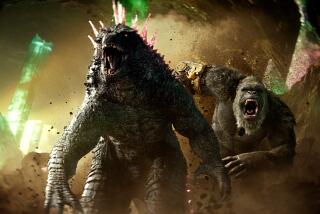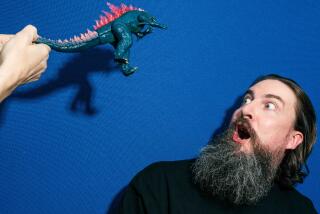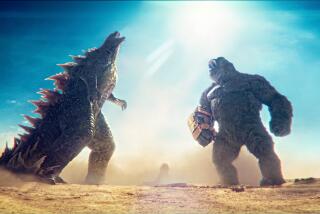‘Monster Hunt,’ a monster hit in China, was a scary journey for director Raman Hui
Reporting from BEIJING — “Monster Hunt,” a new Chinese family film that features real-life actors interacting with computer-animated monsters, has shattered box-office records on the mainland this month, earning more than $250 million and becoming the top-grossing Chinese movie of all time.
But about nine months ago, director Raman Hui was literally in tears, unsure how he would ever bring his dream movie to screen.
The Hong Kong native had considerable Hollywood experience, having worked on DreamWorks Animation films including “Antz,” “Shrek” and “Shrek 2,” and even co-directing “Shrek the Third.” Yet whatever challenges Hui had faced over the years in dealing with the grumpy green ogre, one major upside of a cartoon leading man like Shrek is that he can never get busted on drug charges and throw an entire production into jeopardy.
SIGN UP for the free Indie Focus movies newsletter >>
That, however, is precisely what happened on “Monster Hunt.” And how the production bounced back is a remarkable tale of determination and hustle in China’s rough-and-tumble movie market, where box-office receipts are surging but regulations are often vague and unevenly applied.
Produced by Bill Kong (known for critical and commercial hits such as Ang Lee’s “Crouching Tiger, Hidden Dragon” and Zhang Yimou’s “Hero”), “Monster Hunt” had finished shooting in 2013. By last summer, the sets had been junked and the special effects were about 70% done.
Then suddenly, Hui’s star, Taiwanese actor and singer Kai Ko, was arrested in Beijing in August 2014 and admitted using marijuana. Hui — who had never before directed a movie in China, nor one with live actors on screen — initially figured the situation and attendant bad publicity would just delay the release a little from its planned opening in February 2015, during the prime Chinese New Year holiday.
“My first reaction was, oh … that means I’ll have more time to make the special effects even better,” recalled the bubbly, compact Hui, who looks far younger than his 52 years. “Silly me!”
One day last fall, Hui’s phone rang while he was reviewing some special-effects shots.
It was producer Doris Tse. She and Kong, who had shepherded the project since its inception around 2008, had come to a decision. Morals-minded mainland Chinese authorities seemed unwilling to allow the showing of a film with a drug-using headliner anytime soon. “She called to say, ‘I think we are serious about reshooting,’” recalled Hui.
It would be a massive undertaking costing millions of dollars; they would have to refilm 70% and redo 25% of the special-effects work, call back the cast and crew, find a new leading man and rebuild sets. Kong was hoping it could all be done in time for a July 2015 release.
Hui hung up and went back to work. “After two shots, we looked at one [scene] with no actors, just monsters. And my reaction was, OK, this shot is safe. We don’t have to change this,” he remembered. “Then I started crying. I just burst out in tears.”
‘Monster’ birth
“Monster Hunt” revolves around a friendly baby monster with four arms and two legs. His white body and tuft of green, plant-like material atop his head give him the vague appearance of a daikon radish. When war breaks out in the monsters’ territory, the pregnant queen flees for her life and ends up transferring her unborn into a human man, making him pregnant. (That role, initially played by Kai Ko, was recast with Jing Boran.)
Once baby Wuba is “born,” his man-mother and a female human monster hunter (Bai Baihe) resolve to take the creature to the big city and sell him. But along the way, the couple bond with the tyke — and grow sweet on each other. Song-and-dance numbers punctuate the martial arts-style action.
As early as about 2005, Hui had asked Kong, a fellow Hong Konger, whether it would be possible to return home or to mainland China and make an animated film. “Deep down in my heart I wanted to do something in Chinese,” Hui said.
The producer shot him down. “I didn’t have any experience with animated films,” Kong recalled. Hui said: “I gave up that hope of being able to come back.”
But about three years later, Kong was visiting Hollywood and invited Hui out for drinks on Sunset Boulevard. “He casually said, ‘Why don’t you make a movie for me — a live-action film with computer graphics,’” Hui recollected. “I said, ‘Sure, I’ll give it a try.’”
They started looking for comic books or other intellectual property to adapt, but nothing clicked. Kong introduced Hui to Hong Kong writer Alan Yuen and the two brainstormed. The script began to come together in 2009, taking vague inspiration from monsters mentioned in classical Chinese literature, but with an original story.
Kong was still hesitant. Finally, Hui and Yuen went to a Beijing-based visual effects house, Base FX, and made a four-minute test film in 2012. That helped give the team confidence to move ahead.
“I was a believer from the start,” said Christopher Bremble, chief executive of Base FX. “Raman [Hui] is a very special person. He’s a smart, fun, happy guy who brought something unique. And he gives very meticulous notes about animation shots.”
But Kong wasn’t crazy to be cautious, Bremble said. At the time, China’s movie market — now the world’s second largest behind only North America — was just starting to boom.
Hui came to China in early 2013 and began assembling his crew, even as he continued to do consulting work for DreamWorks. For a director who had spent his whole life working in fully animated films, he regarded the tangible, human nature of “Monster Hunt” as a challenge, but mostly a thrill — and certainly not the pitfall it turned out to be.
“It was all new to me. I still recall I was so excited to see a costume being made. Before that, all the ‘Shrek’ costumes were inside a computer. You can’t touch it. For this movie, you could touch the fabric,” he said. “It was like a toy shop, so exciting.”
All was going fairly swimmingly until Ko’s arrest and a cloud of uncertainty descended over the project.
No officials directly ordered the film to be reshot, Kong said, but doing nothing meant the movie might languish in limbo indefinitely. “There was a holding period for actors who are badly behaved,” Kong said, and it was unclear how long it would be. He opted for reshoots. “I see it as a normal business decision, there’s not much heroism in here.”
But when Bremble heard about the plan to refilm most of “Monster Hunt,” he says his initial reaction was “fear. And concern for Bill, who had made a big investment in the project.” The reshoots, said Kong, pushed the budget to about $56 million.
“Bill wanted us to be in charge,” said Hui. “He wanted us to be able to take our own destiny and be in control.”
Some people in China’s film industry, behind Kong’s back, questioned the wisdom of reshooting the film. “People said if he had spent a quarter of the money on bribes as he spent on reshoots, he might have gotten the film approved,” said Raymond Zhou, a prominent Chinese film critic.
Months later, another film that Ko had a smaller part in, “Tiny Times 4,” was allowed a mainland release. So was “Monk Comes Down the Mountain,” in which Jaycee Chan — Jackie Chan’s son, who was arrested along with Ko — had a role.
Still, Zhou said Kong’s straightforward way of dealing with the “shady and not transparent” rules earned the producer “an undercurrent of sympathy” in the industry.
‘A new tradition’
The second filming took place over five weeks, finishing in late March. Every day, as he completed his shots, Hui would edit and send the footage to Base FX so that effects work could start immediately.
In addition to redoing all the scenes that had previously contained Ko, Hui and Kong added several new sequences and new roles for some additional well-known actors, to boost the movie’s star quotient.
“Bill never gave up and never lost confidence,” Bremble said. “He never played the victim. Instead, he stayed positive and focused and said American studios often do reshoots. Let’s make this a new tradition for China.”
Nobody expected the film to become China’s highest-grossing. The film did benefit from getting a release slot during China’s annual summer blackout period of foreign films. That meant “Monster Hunt” didn’t have to contend with “Minions,” “Inside Out” or other Hollywood blockbusters, but it still had stiff competition from other Chinese summer movies.
“I thought ‘Monster Hunt’ would be pounded and defeated,” said film critic Zhou. But audiences responded to the movie’s heartwarming story, positive family values and cute animation. As of Thursday, the film had earned $250 million in China, making it the No. 3 movie of all time in the country, behind only “Transformers: Age of Extinction” and “Furious 7.”
Kong said a sequel is already in the works. As for a U.S. release, the producer said he’s received multiple expressions of interest, but nothing has been finalized yet. “I don’t think it can find a general audience in the U.S., but maybe in Chinese communities or home entertainment,” he said.
Still, Zhou said “Monster Hunt” and another recent successful Chinese cartoon, “Monkey King: Hero Is Back,” are boosting the confidence of filmmakers and filmgoers in Chinese-made animation. “If the movie had flopped, everyone would now be laughing at Kong, saying he was ridiculous,” said Zhou. “Now, he looks like a visionary.”
Nicole Liu in The Times’ Beijing bureau contributed to this report.
MORE:
Made-in-China movie draws fire as a copycat of Pixar’s ‘Cars’
China box office surges nearly 50% in first half of 2015
Watch out, Hollywood: Chinese entertainment, tech execs grow more confident
More to Read
Only good movies
Get the Indie Focus newsletter, Mark Olsen's weekly guide to the world of cinema.
You may occasionally receive promotional content from the Los Angeles Times.











